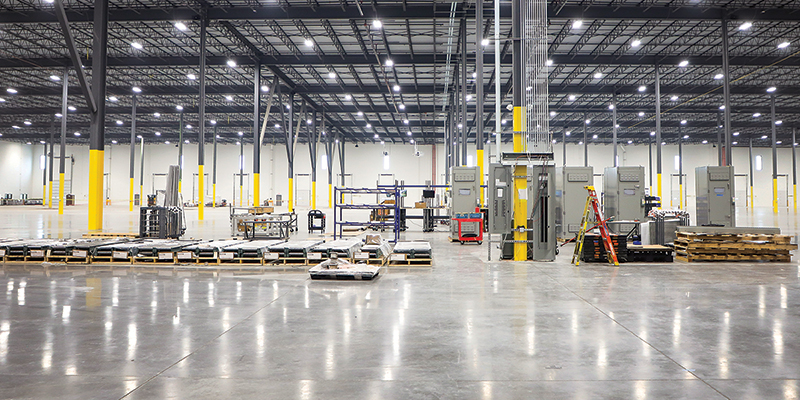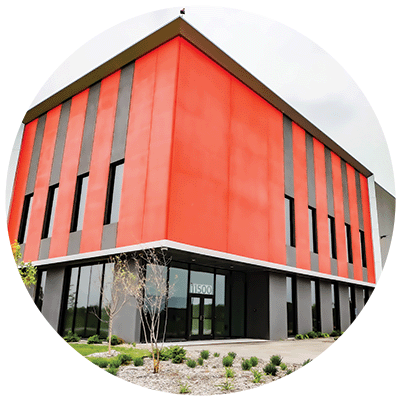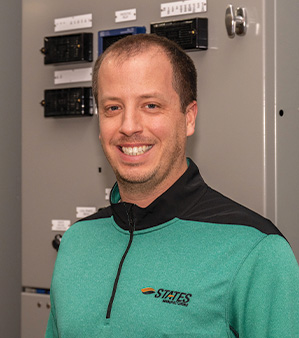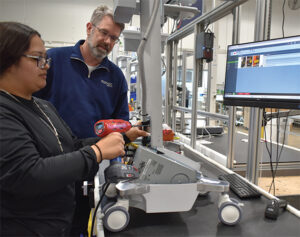On the company website for States Manufacturing in Champlin, the first photo on the “About Us” page is a state-of-the-art panelboard, its electrical wiring arranged neatly — even elegantly — within an industrial cabinet to showcase the company’s emphasis on electrical solutions, metal fabrication, and equipment shelters. It’s a sleek, high-tech space so spotless that there’s a reflection of the cabling in the stainless-steel case.

The next photo on the same page? Not quite so tidy.
In this one, a sepia-toned throwback from nearly 100 years ago, employees with dirty aprons and rolled-up shirtsleeves lean against wooden tables that still have electrical components from the time, but the space is a chaotic mix of pulleys and buckets of nails, with low ceilings and ersatz workstations.
Bringing together those major elements — entrepreneurial history along with forward-thinking manufacturing — is now the task of Wyatt Shallbetter, the company’s CEO, and the fourth generation to step into that role. Taking over from his father just three years ago, Shallbetter has already made major strides in initiating change, and he’s just getting started.
Creating a road map
Founded in 1922 by Anthony Shallbetter as States Electric Manufacturing Company, the business quickly became a leader in the design, engineering, and manufacture of custom electrical and precision fabricated metal products. In 2010, the name was changed to States Manufacturing Corporation to better reflect the breadth of its capabilities as well as expanded market reach.
The manufacturer now offers integrated services through three groups: electrical solutions, metal fabrication, and equipment shelters. That means States can handle end-to-end manufacturing through all stages, including design, engineering, custom fabrication, and on-site support. States serves a range of industries and installations, from stadiums and courthouses to utility companies, mining enterprises, hospitals, and data centers.
As Shallbetter stepped into the CEO role, he worked with his father, Joe Shallbetter, to refine the company’s focus. The manufacturer had always emphasized the latest technologies and processes, adhering to rigorous safety standards, and delivering quality products that ensured happy customers. But what it needed, they thought, was a clearly stated 10-year plan that identified strategic pathways to reach specific areas of growth.
That major shift falls under what Shallbetter calls the “head heart hands” category of decision making: What does the company believe in? What does the data say about what the company does best? And what do the leaders feel in their heart is the right direction? In analyzing those factors, Shallbetter and his team decided to let go of the precision sheet metal side and focus only on electrical products.
“Developing that plan as a joint vision allowed me to focus on growing States in a more targeted manner,” he says. “For instance, for a long time, there wasn’t clarity over whether we were predominantly a precision sheet metal company or if we would specialize in electrical products. By putting our efforts into the latter, we can grow in a different and more meaningful way.”
“This created the structure for building the company because everything else fell in line under that decision,” he says. “It defined what we have to do in terms of people, resources, and facilities.”
Building and expanding
The drive to grow began about five years before Shallbetter took the helm, but it’s accelerated in the past few years. The company has expanded in terms of space, machines, and employee numbers.

For example, when States was operating in Golden Valley, it had 64 employees, but after its move to Champlin in 2022, that number surged up to 185 for its headcount. Square footage is set to boom as well: In January 2025, States signed a 503,440-square-foot industrial lease to occupy half of The Cubes at French Lake in Dayton.
Built in 2024, the cross-dock warehouse has 60-foot speed bays, 231 trailer parking spaces, and a clear height of 40 feet. States has started building out the space to support greater capability for fabrication and manufacturing of customized electronic and metal products — particularly larger equipment shelters — and will be the site of its new headquarters. States will also retain its Champlin facility and has further expanded the site by occupying the entirety of the 135,000-square-foot facility in Champlin. The anticipated investment in the buildout is about $23 million for equipment and site development, and States signed a 12-year lease.
The expansion could bring 340 jobs to Dayton in the next three years, according to estimates from the Minnesota Department of Employment and Economic Development.
Of course, planning to add hundreds of jobs and actually finding employees to fill those roles can be two different things, which is why recruitment, hiring, and retention are significant parts of the 10-year roadmap, he adds. What helps is that the company culture is strong, with a tight-knit group of employees who are eager to refer others. Although it’s a cliche to say that a team should feel like a family, Shallbetter says that description fits for States — after all, it’s been a family business for almost 103 years — and that powerful company culture has been a boon to increasing the headcount so rapidly.
There’s a sense of camaraderie and collaboration throughout the facility, he explains, and there’s often laughter echoing down the hallways. He frequently sees surprise on the faces of candidates during interviews, because they notice the “vibe” right away. “Everyone wants to be at a place where they feel their work is valued and they’re part of a real team, which means people who work together and succeed together,” says Shallbetter. “You can feel that here just walking through the doors.”
Not only does that lead to more efficient processes and creative problem-solving, it also makes it easier to draw employees and keep them on the payroll once they’re at States.
“We really have seen a snowball effect,” he says. “We have a very low turnover rate, it’s in the single digits, and that says a great deal about a workplace. Recruiting is never easy, especially in manufacturing, but for us it hasn’t been as difficult as it might be without the culture we have.”
Another aspect that adds to retention is a robust emphasis on individual career growth, he adds. Engineers just out of college have historically had narrow career paths, he says; they can move up in terms of management role, but they don’t tend to have opportunities to move laterally if they’re interested in lending their insights to a different aspect of the company. For instance, engineers aren’t usually encouraged to pursue sales and marketing or customer service, but at States, those spots are open for any engineer who’s interested.
“The type of talent we attract doesn’t want to do the same thing forever,” Shallbetter says. “They want to grow their skillset, do different types of projects, maybe even move into sales if that’s what’s driving them. Knowing they can do that here — even if they don’t take that route — is one more reason our retention numbers are so high.”
Market pivots
Another aspect of States’ 10-year plan is expansion into new markets, particularly since the manufacturer can draw on its strengths in customization, Shallbetter says.

CEO, States Manufacturing
“Our major competitors don’t have as much expertise with that, or they’re not completely vertically integrated, so that makes them less flexible. But we control our entire manufacturing process, so we have the flexibility needed for customization at every level.”
Although tariffs are a new point of discussion, the company anticipated well in advance that there might be shifts related to trade, and they’ve made moves to mitigate any potential disruptions. States has always manufactured domestically, so it has an advantage in that regard, but it started pre-securing more raw materials from Europe and South America in 2024, which Shallbetter says will allow States to stay ahead of higher pricing.
In terms of competition, the demand for power — especially at data centers — is bringing more players into the space. But States’ position as a solutions provider has positioned the company ahead of the market in providing end-to-end solutions for the largest market providers in the data center space. This enables a single source solution that many of the large providers crave.
“New companies don’t have the experience we do, so they’re likely to underestimate the scope of a project and underdeliver,” he says. “It takes time for that underdelivery to become apparent, but sophisticated customers recognize it and move on from poor quality quickly. It will take time, but we’re confident that we can demonstrate why quality and experience matter, as these competitors fall away.”
Geographic and data center expansion may contribute additional factors for growth, he adds. Right now, States’ customer base is primarily focused in North America, but the data center market is expanding quickly, especially with AI becoming more prominent.
Centers that cater to AI companies use 10 times the amount of power utilized by data storage companies, so they have unique needs for customized electrical components. These centers may also begin cropping up more often outside of North America, based on where they can get the least expensive land and power sources, so States is prepared to use that expansive Dayton manufacturing space and ample Champlin space to meet the needs of companies in other geographic regions, if necessary.
Challenges with generational change
As Shallbetter works to transition States Manufacturing toward the future, he acknowledges that there are still some hurdles to overcome. The first is that a shift from one generation to the next nearly always comes with some difficulties.
For example, many family-owned companies struggle with business continuity when the reins are handed to a younger generation, writes Kristin Keffeler in the Harvard Business Review; she’s a family enterprise consultant and author of The Myth of the Silver Spoon: Navigating Family Wealth & Creating an Impactful Life. Family businesses often adopt the best practices that public companies use for talent management, strategic growth, and organizational adaptability, she notes.
“However, if a family wants to retain control of their enterprise for years to come, they must also be able to navigate some challenges that public companies don’t face, including managing family dynamics and conflict, and cultivating talent and leadership within the family,” she writes. There is also immense pressure to succeed and measure up, Keffeler adds, and that can be a higher bar for a family member than it would for a non-family CEO even if expectations are lofty for that executive.
She notes that an antidote to these pressures can be development of a growth mindset. “People who have [this] mindset believe that human traits (like intelligence, resilience, and grit) are malleable and can be developed through hard work, good strategies, and thoughtful feedback.”
That’s the track Shallbetter seems to be taking — relying on a growth mindset to propel the company forward and relying on a team who embraces that perspective rather than bristles against it.
“One of the biggest differentiators for me as a CEO compared to past generations is the perpetual pursuit of growth for the organization as a whole,” he says. “Change doesn’t bother me. In fact, I see it as lever that should get pulled whenever possible. In the past, our family was successful, but they did tend to take the view of, ‘If it’s working, then why change?’ and that may have limited our pursuit of new markets.”
The growth mindset has escalated States Manufacturing to a “hockey stick rate of change,” he adds. And it’s not just Shallbetter who embraces that approach; the entire workforce is aligned behind that mindset, says Joel Scalzo, a business development consultant for Enterprise Minnesota.
“States doesn’t rest on its success; instead, the organization continuously challenges itself to improve,” he notes. “The States team has a shared mindset — from the newest hire to the CEO — that believes, ‘We can always do better.’ That drive for continuous improvement is central to how States grows, evolves, and sustains its leadership in the industry.”
Of course, not all change is beneficial, as any business leader knows. Moving fast can occasionally come with some setbacks and breakages, or shortfalls when it comes to entering new markets or innovating on existing products. But those potential stumbles aren’t enough to slow the momentum at States, says Shallbetter.
“One piece of advice my father gave me early in my career, and what made him such a standout as a leader, was that he said I should never be afraid to fail,” he says. “But he said if I’m going to do that, I should fail forward. I should always look to make a change for the better, not just change for the sake of it. That’s stuck with me and in many ways, it helps me feel bolder in my approach, and that even with such a rich company history, we’ll continue to move forward.”
Return to the Summer 2025 issue of Enterprise Minnesota® magazine.


